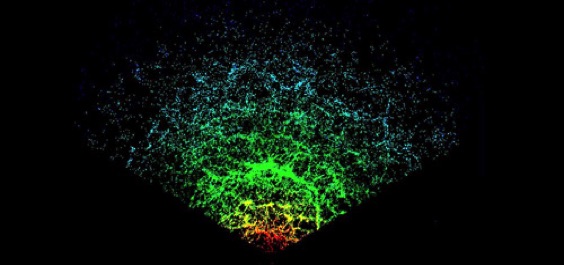
Do Not Be Bound
Together With
Unbelievers
(II Cor. 6:14)
Be Ready Always To
Give An Answer
To Everyone
(I Peter 3:15)

Are We Located In The Center Of The Universe?
If Confirmed, Will Rock the Foundations of Modern Cosmology
Lift up your eyes on high, and see who has created these things, Who brings out their host by
number; He calls them all by name, by the greatness of His might and the strength of His power;
not one is missing.
- Isaiah 40:26
In 1609, astronomer and physicist, Galileo Galilei, discovered
the earth did not lie at the center of the Solar System, the accepted
view at the time (i.e., geocentrism), but found that the sun lied at its
center (heliocentrism). As a result, the Italian astronomer was put
under house arrest by Pope Urban VIII for the rest of his life. The
Catholic Church did not tolerate such heresies.
However, in a twist of irony, 400 years later modern
astronomers using the latest telescopes and state-of-the-art
technology found that our earth is very likely located, not in the
center of the Solar System, but the center of the universe. This view
is known as Galactocentrism, the theory that the Milky Way galaxy,
home to our earth and Solar System, lies at the center, or very near
the center, of the entire Cosmos.
American physicist, Dr. Russell Humphreys (Ph.D), of Creation
Ministries International, who's studied quantized redshifts for some time, describes the phenomenon:
"Over the last few decades, new evidence has surfaced that restores man to a central place in God’s universe. Astronomers have confirmed that numerical values of galaxy redshifts are ‘quantized,’ tending to fall into distinct groups. According to Hubble’s Law, redshifts are proportional to the distances of the galaxies from us. Then it would be the distances themselves that fall into groups. That would mean the galaxies tend to be grouped into conceptual spherical shells concentric around our home galaxy, the Milky Way. The shells turn out to be on the order of a million light years apart. The groups of redshifts would be distinct from each other only if our viewing location is less than a million light years from the centre [i.e., if we moved a million light years from the center in any direction, we could not see the rings. CK]. The odds for the Earth having such a unique position in the cosmos by accident are less than one in a trillion. Since big bang theorists presuppose the cosmos has naturalistic origins and cannot have a unique center, they have sought other explanations, without notable success so far. Thus, redshift quantization is evidence 1) against the big bang theory, and 2) for a Galactocentric cosmology... If God used processes as part of His making the stars and galaxies on the fourth day of Creation, then redshift quantizations are evidence that some of the processes were spherically symmetric around our galaxy."
(In other words, if God made the earth first on day 1 [Gen. 1:1-5], and then made the sun, moon and stars on day 4 [Gen. 1:14-18], the quantized redshifts reflect this process.)
Quantized Redshifts Show Our Galaxy Is In The Centre Of The Universe,
https://creation.com/our-galaxy-is-the-centre-of-the-universe-quantized-redshifts-show
Dr. Humphreys' Profile
https://creation.com/d-russell-humphreys-cv
Quantized Redshifts Confirmed By Secular Scientists
https://link.springer.com/article/10.1007/BF02709337#
https://www.nytimes.com/1992/09/15/science/jumps-in-star-speeds-perplex-astronomers.html
Yet, in spite of the overwhelming evidences of these quantized redshifts, most astronomers are not happy with the news. Secular cosmology, based on godless evolution, cannot tolerate a center in the universe, or a special place for the earth. Stephen Hawking and
George Ellis acknowledged this in their influential 1973 book, The Large Scale Structure of Space-Time:
"... we are not able to make cosmological models without some admixture of ideology. In the earliest cosmologies, man
placed himself in a commanding position at the centre of the universe. Since the time of Copernicus we have been steadily
demoted to a medium sized planet going round a medium sized star on the outer edge of a fairly average galaxy, which is itself
simply one of a local group of galaxies. Indeed we are now so democratic that we would not claim that our position in space
is specially distinguished in any way."
Presbyterian astrophysics professor, Richard Gott, agrees:
"The Copernican revolution taught us that it was a mistake to assume, without sufficient reason, that we occupy a privileged
position in the Universe. Darwin showed that, in terms of origin, we are not privileged above other species. Our position around
an ordinary star in an ordinary galaxy in an ordinary supercluster continues to look less and less special. The idea that we are
not located in a special spatial location has been crucial in cosmology, leading directly to the big bang theory."
Cosmological celebrity, Carl Sagan, devoted an entire book to mock and belittle our preeminence in the cosmos:
"The Earth is a very small stage in a vast cosmic arena… Our posturing, our imagined self-importance, the delusion that we
have some privileged position in the Universe, are challenged by this point of pale light [a photo of Earth taken from Saturn by
Voyager I]. Our planet is a lonely speck in the great enveloping cosmic dark. In our obscurity, in all this vastness, there is
no hint that help will come from elsewhere to save us from ourselves."
Dr. Humphries disagrees with Sagan:
"Darwinism and the Big Bang are two halves of the whole—physically and biologically—of an atheistic origins myth. A galactic
center conflicts with the atheist desire that the Earth is not in a special location. Yet, if it turns out that we are in a unique geometric center, mankind will be restored to a central place in God's creation, physically as well as spiritually."
This is the Sloan Digital Sky Survey Map, each point representing a galaxy with a measured redshift and showing the position
of galaxies with respect to Earth at the apex [i.e., the bottom]. Their distances were determined from their spectra to create a 2 billion light-year-deep 3D map where each galaxy is shown as a single point. This is one-half of the published map; the whole map
shows 66,976 galaxies that lie near the plane of Earth’s equator from the 205,443 galaxies mapped.
- The Astrophysical Research Consortium / Sloan
Digital Sky Survey Collaboration
In closing, Dr. Humphries explains why this is so vastly important:
"... it is very encouraging to see evidence for the centrality of humans to the plan of God. It was a sin on this planet that subjected
the entire universe to groaning and travailing (Romans 8:22). Ours is the planet where the Second Person of the Trinity took on the (human) nature of one of His creatures to redeem not only us, but also the entire cosmos (Romans 8:21). This knowledge that
God gave minuscule mankind [a central location] in a vast cosmos astounds and awes us, as Psalm 8:3-4 says:
To be saved from your sins you must:
- Believe in the Lord Jesus Christ (John 8:24; Acts 16:31)
- Repent of your sins (Mat. 3:2; Luke 13:3-5)
- Confess Jesus publicly (Mat. 10:32-33; Romans 10:9-10)
- Be immersed (baptized) into Christ for the remission of your sins and the gift of
the Holy Spirit (Acts 2:38; Matt. 28:18-20)
- Live faithfully until death (Rev. 2:10; James 1:12)
When I consider your heavens, the work of your
fingers, the moon and the stars, which you have ordained;
What is man, that you are mindful of him? and the son
of man, that you visit him? - Psalms 8:3-4


The Center of the Universe

Web Telescope Image
Concentric Rings Are Visible
https://creation.com/images/journal_of_creation/vol24/8298SDSS-map.jpg

